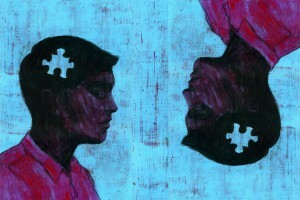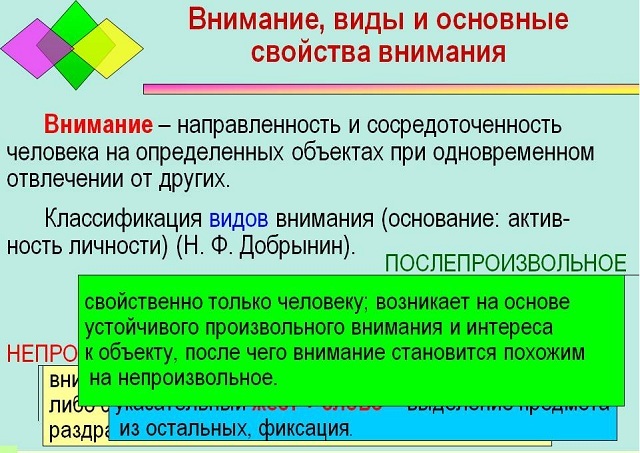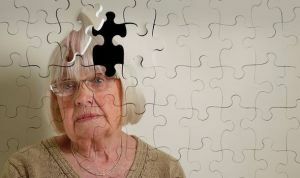 Speaking of a phenomenon such as amnesia, it is often called a disease. If we consider this phenomenon more broadly, we can conclude: in fact, amnesia is only a symptom of another existing disease - neurological or psychiatric.
Speaking of a phenomenon such as amnesia, it is often called a disease. If we consider this phenomenon more broadly, we can conclude: in fact, amnesia is only a symptom of another existing disease - neurological or psychiatric.
Amnesia refers to the general or partial inability of a person to remember events - both long ago and recently. Such a phenomenon arises as a result of violation of the process of memorization, reproduction and storage of information.
The disorder is diagnosed in the elderly and in young people. In the first case, it can be explained by the natural degenerative processes in the brain, which are of an age-related nature. In the second case, the causes of amnesia can be severe head injuries, alcohol abuse, intoxication and some other factors.
In humans, amnesia can manifest itself in several forms, depending on which the prevalence of certain symptoms is observed.
Persons suffering from memory disorders usually experience severe headaches, are unable to navigate in space and time, can not recall important data and significant events of their life.
Also for the clinical picture of this condition are anxious and depressive conditions. Amnesia can have a progressive course, but the probability of its spontaneous occurrence is not ruled out.
Contents
- Why does it take away memory?
- Classification - unconsciousness can be different
- Transient disturbance
- Alcohol discourages memory
- Clinical picture
- Methods for diagnosing amnesia
- Memory recovery
- Memory fault prevention
Why does memory consume?
The roots of amnesia lie in the processes associated with pathological changes in brain structures. Memory impairment in the elderly, as mentioned earlier, is observed as a result of the natural aging of the organism and the slowing down of all its organs and systems.
In some cases, amnesia in old age occurs due to Alzheimer's disease. This disease is characterized by the death of individual neurons, which leads to the development of dementia.
At an earlier age, the development of amnesia can be caused either by mechanical damage to structures and areas of the brain, or by psychological disorders.
Memory loss provoked:
- Parkinson's disease;
- Alzheimer's disease;

- brain tumor;
- concussion;
- mechanical damage to the brain and its structures;
- cerebrovascular disorders;
- is a disorder of cerebral circulation;
- epilepsy;
- dyslexia( impaired ability to read, in most cases due to genetic abnormalities or damage to brain structures);
- depressive states;
- taking certain medications or drugs;
- alcohol abuse;
- previous stroke;
- HIV;
- meningitis;
- intoxication of the body;
- lack of nutrients as a result of an unbalanced diet;
- suffered mental trauma, emotional shock.
All described factors lead to disruption of anatomical structures, which are responsible for memory functioning, namely memory, perception, fixation of received information. Against this background amnesia develops.
Classification - unconsciousness is different
Classification of types of amnesia can be based on several characteristics, depending on the rate of its development, the following types are distinguished:
- Regressing .Characterized by the gradual restoration of forgotten memories. This kind is found in individuals who have suffered from
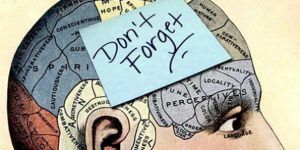 from traumatic brain injuries, concussions or have recently come out of anesthesia.
from traumatic brain injuries, concussions or have recently come out of anesthesia. - Fixed .In this case, individual events are deleted from the memory. This process has a persistent character, without changes, that is, a person forgets certain events from his life and does not remember them more. The causes of this type of violation can be senile dementia, psychological trauma, head trauma.
- Progressive .Memories are removed from memory gradually, from recent to long-past events. For this type of amnesia is characterized by a clearer preservation of childhood and youthful memories, as well as professional skills. Provoke memory disorders of this kind of brain tumor, mental illness.
Also, amnesia is classified according to the moment in which individual memories were lost:
- Retrograde .This is a pathological condition in which events from the memory of a person "fall out" that occurred before the development of the disease or injury, which provoked amnesia. At the same time, the facts and events that occurred in the remote past are preserved, especially if they have great emotional significance for the victim. Retrograde amnesia develops on the basis of cerebral circulation disorders, craniocerebral trauma, stressful situations, deep emotional shocks.
- Anterogradnaya .This condition is characterized by the loss of events that occurred after the amnesia-provoking disease developed or after receiving a severe head injury. This type of memory impairment occurs in the elderly, after traumatic brain injuries and infectious diseases, in the presence of mental disorders.
- Anteroretrogradradnaya .As the name suggests, this kind of amnesia combines the features of the first and second described above and arises after an especially severe head injury. As a rule, individual events that preceded the turning point are forgotten and some events that follow it.
- Retarded, or retarded .In this case, memory impairments are not immediately apparent, but only after a certain time after the turning point. It can occur against the background of acute psychoemotional shocks.
Separately, it is necessary to mention such types of memory disturbances as transient global and alcoholic amnesia.
Transient disturbance of
Transient global amnesia is a temporary phenomenon in which a person suddenly loses memory and spatial reference points.
At the same time, he is able to recall his own name and close relatives' names, make numbers folding, keep score. The duration of this state is from several hours to several days.
After a certain period, all his abilities are returned to the person. It happens spontaneously.
The reasons for this are not fully understood, but it is assumed that they can be attributed to:
- transient cerebral circulation;
- epilepsy;
- disorders in the functioning of the cerebral vascular system;
- transferred stress;
- Migraine.
Specific treatment for transient global amnesia is not required, all symptoms pass independently.
Alcohol memory beats
 Alcoholic amnesia is a memory impairment that is associated with the abuse of alcoholic beverages. In this case we are talking about the inability of a person to remember events that occurred after intoxication, and to realize the actions performed in this state. This is due to the disturbance of nerve impulses caused by the use of alcohol.
Alcoholic amnesia is a memory impairment that is associated with the abuse of alcoholic beverages. In this case we are talking about the inability of a person to remember events that occurred after intoxication, and to realize the actions performed in this state. This is due to the disturbance of nerve impulses caused by the use of alcohol.
With severe alcoholism, memory can no longer be erased from individual episodes, but whole fragments of occurring events. Subsequently, constant drinking-bouts can lead to alcoholic dementia, which is characterized by a total loss of memory with preservation of memorization processes.
If you do not start treatment on time, there is no guarantee that memory will return to the alcohol-dependent patient to the fullest.
Clinical picture of
Partially, the symptoms of amnesia have already been mentioned in describing the condition of patients. Its manifestations, in the first place, depend on the type of violation. The amnesiac suffers from such problems:
- loss of memory for events that have occurred in the last few years;

- complete disorientation in time and space;
- confusion( typical for people who, due to unbalanced nutrition, there is a deficiency of vitamins in the body);
- visual impairment( with Wernicke's encephalopathy);
- drowsiness;
- delirium and emotional arousal( with severe forms of amnesia);
- difficulties in remembering information about the flow of events that occurred recently;
- confabulation, or false memories - in this case a certain period is erased from the person's memory, which he tries to fill with events that did not actually happen.
Methods for diagnosing amnesia
To diagnose memory impairment and determine the type of amnesia, the following methods are used:
- Collecting an anamnesis of the patient regarding how long and for what period the memory was lost, which preceded this, did the
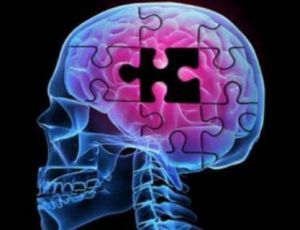 occur earlier.
occur earlier. - Neurological examination of , during which the specialist determines the presence of abnormalities that could cause amnesia.
- The patient is examined by a psychiatrist in order to find emotional and intellectual disturbances.
- Computer and magnetic resonance imaging .These procedures are necessary for a comprehensive study of the structure of the brain. They allow us to identify structural changes in it, the presence of a tumor, the thinning of the cortex, and circulatory disorders that have caused amnesia.
- Electroencephalography .With the help of this method, the activity of individual parts of the brain is evaluated, which can change in the presence of deviations and diseases.
The procedures described in the last two paragraphs are referred to the methods of differential diagnosis, that is, to those that allow us to establish the cause of the development of amnesia. They also need to add a blood test, toxicological and biochemical analyzes.
Memory recovery
Treatment of amnesia must necessarily be comprehensive and contribute to the achievement of the following objectives:
- eliminating the causes of memory problems;
- rid the patient of internal conflicts;
- overcoming psychological trauma;
- patient's achievement of sufficient relaxation;
- replenishment of deficiency of vitamins and nutrients in the body;
- improvement of the patient's neuropsychological state;
- recovery of brain functions.
The treatment itself includes such methods: 
- administration of drugs that improve memory, concentration, promote brain nutrition, among such drugs - Nootropil, Memantine, Undevit;
- reception of vitamin-mineral complexes to provide the body with all the necessary trace elements;
- therapy of the underlying disease that provoked memory impairment( with craniocerebral trauma, tumors, mental abnormalities);
- conducting sessions of psychotherapy.
In addition, a prerequisite for successful treatment is compliance with the rules of a healthy lifestyle.
Prevention of memory disorders
To avoid a problem such as amnesia, it is necessary:
- to be observed at the doctor and regularly undergo preventive examinations;

- to control blood pressure;
- immediately seek help from a specialist for changes in health status;
- is more likely to be outdoors;
- to observe a full sleep mode( sleep at least 8 hours);
- to eat correctly, often, fractional;
- if possible, refuse to take medications that impair memory;
- coaching memory: remember reading, remembering in details seen, learning poems.
Amnesia has many varieties, and each of them is an alarming symptom that indicates the presence of a serious disease. Do not neglect it: the slightest delay can lead to irreversible consequences.


